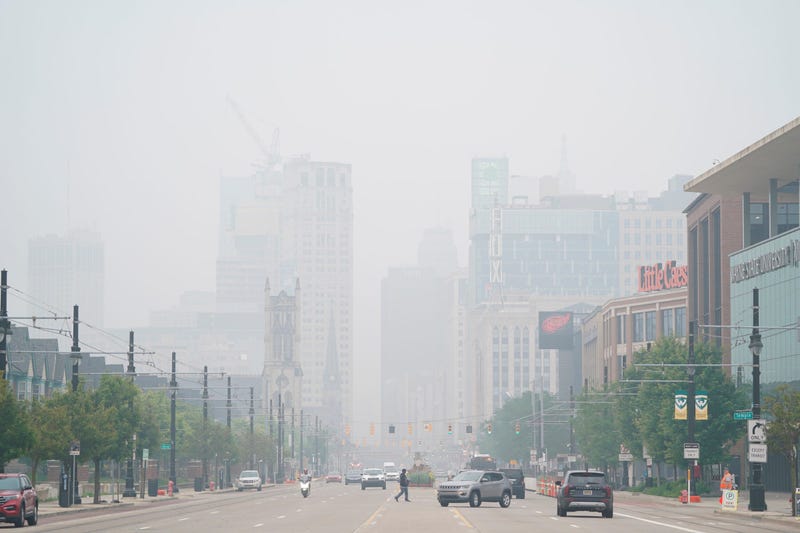
(WWJ) – The ongoing fires to our north in Canada have led meteorologists with the Michigan Department of Environment, Great Lakes, and Energy (EGLE) to extend their Air Quality Alert for another day.
EGLE officials say high levels of fine particulate matter (PM-2.5) in the air caused by smoke from fires in Canada has led to unhealthy air quality.
As was the case Tuesday, an Air Quality Alert will be in effect Wednesday, June 28 for all of Michigan as the average air quality is “expected to fluctuate between unhealthy for sensitive groups to unhealthy for everyone.”
In fact, Detroit had the worst air quality of anywhere in the world as of 7 p.m., according to IQAir Index data.
EGLE officials say there’s a possibility that the Upper Peninsula and northern Lower Peninsula will experience some hours when the Air Quality Index will be “very unhealthy or hazardous for everyone.”
AccuWeather meteorologist Brian Thompson said Tuesday afternoon “incredibly thick haze” had brought visibility down to as low as one mile in some parts of Metro Detroit.
“Even as the sky clears into this evening, we’re still not gonna see much in the way of sun because of how thick the haze is,” he said. “With the air quality around, not a great night to have the windows open.”
Numerous events across the state were canceled or postponed Tuesday night due to the air quality, including the Concert in the Park in downtown Imlay City and the West Michigan Whitecaps baseball game near Grand Rapids.
Visibility near the Mackinac Bridge was extremely low on Tuesday afternoon, leading the Mackinac Bridge Authority to tell drivers to reduce speed to 20 mph max, turn on low-beam headlights and drive with caution.
EGLE says anyone can get sick from exposure to wildfire smoke, but some people are more sensitive to particle pollution. Adults aged 65 and older, pregnant people, children and people with lung and heart conditions may be more likely to get sick if they breathe in wildfire smoke.
“Symptoms from breathing in particle pollution from wildfire smoke can include wheezing, coughing and shortness of breath. If you have asthma, follow your asthma control action plan or contact your health care provider if you have symptoms. If you have heart disease and experience these symptoms, contact your healthcare provider,” an EGLE press release says.
The most protective option when air is unhealthy for you is to stay indoors with air conditioning, reduce strenuous activities and limit outdoor activities. If you have to be outside, N95 masks offer enhanced protection when used according to product instructions.
During unhealthy for sensitive groups (AQI orange) to unhealthy for everyone air quality events (AQI red), the Michigan Department of Health and Human Services (MDHHS) advises the following:
For people with heart or lung disease, pregnant people, older adults aged 65+, children and teens it is suggested to take the following steps to reduce exposure:
• Avoid strenuous outdoor activities.
• Keep outdoor activities short.
• Consider moving physical activities indoors or rescheduling them.
For everyone else:
• Choose less strenuous activities (like walking instead of running) so you don’t breathe as hard.
• Shorten the amount of time you are active outdoors.
• Be active outdoors when air quality is better.
The Michigan Department of Agriculture and Rural Development says pets can also be affected by poor air quality. Tips to protect animals include keeping them indoors with doors and windows closed, limiting the amount of time they spend outdoors and avoiding strenuous activities/exercise.
Stay tuned to WWJ Newsradio 950 for the latest traffic and weather updates every 10 minutes on the :08s


